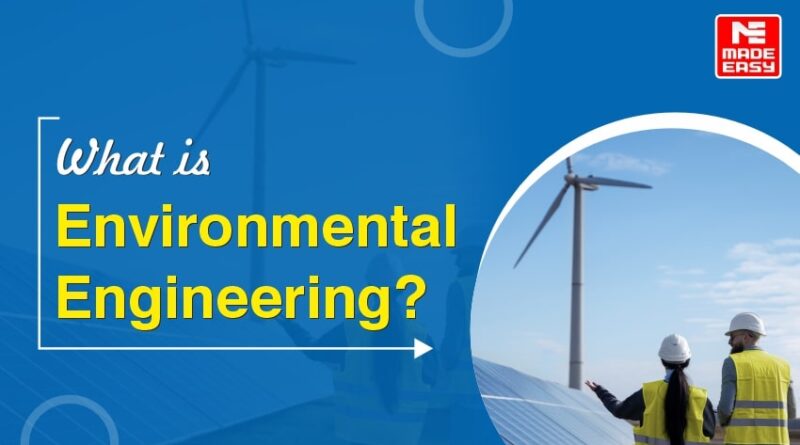What is Environmental Engineering?
Our environment comprises the atmosphere, earth, water, and space. The interaction between the various strata of the atmosphere has been continuing for years. The composition and nature of the environment have been undergoing continuous changes owing to activities like industrialization, transportation, construction, etc. The natural environment is clean, but owing to the aforementioned activities of man, it becomes polluted, giving rise to what is termed environmental pollution.
From the environmental engineer’s perspective, the word environment may assume global dimensions, may refer to a very localized area in which a specific or particular problem must be addressed, or may, in the case of contained environments, refer to a small volume of liquid, gaseous, or solid materials within a treatment plant sector.
Environmental engineering is the practice of developing methods and structures to address environmental challenges that impact the health of society and the environment.
The article will briefly provide you information about environmental engineering and key concepts related to it.
Key Concepts:
- Per Capita Demand (Q)
- Zones of Underground Water
- Interference Among Wells
- Screens
- Sedimentation Tanks
- Mechanism of Coagulation
- Mixing Device
- Theory of Filtration
- Filter Materials
- Chlorination
- Water Distribution
- Analysis of Pipe Network
- Corrosion in Pipes
- Biological Zones in Lakes
- Egg Shaped Sewer
- Sewage Discharge
- Types of Screens
- Grit Removal Basins
- Sludge Digestion Process
- Anaerobic Stabilisation Units
Water Demand
Whenever an engineer is given the duty to design a water supply scheme for a particular section of the community, it becomes imperative upon them, to first of all, evaluate the amount of water available and the amount of water demanded by the public. Let’s understand in brief about water demand and its various types of water demand.
Estimation of demand for water is the key parameter in planning a water supply scheme. The agriculture sector consumes more than 80 percent of the total water potential created in our country. The remaining portion is utilized to meet domestic, industrial and other demands. The improvement in lifestyle and associated industrial development of a nation pushes up the per capita demand for water.
Various types of Water Demand
The prediction of the precise quantity of water demanded by the public is very difficult, because there are so many variable factors affecting water consumption. There are certain thumb rules and empirical formulas, which are used to assess this quantity, which may give fairly accurate results. There are different types of water demands, which are as follows:
- Domestic Water Demand: Domestic water demand includes the water required in private buildings for drinking, cooking, bathing, gardening purposes etc. which may vary according to the living conditions of the consumers.
- Industrial Water Demand: The industrial water demand expresses the water required for industries which are either existing or are likely to be started in future, in the city for which water supply is being planned.
- Institutional and Commercial Water Demand- Water requirements of institutions such as hospitals, hotels, restaurants, schools and colleges, railway stations, offices, factories etc. should also be assessed and provided for, in addition to domestic and industrial water demands.
- Demand for Public Uses: This includes water requirements for parks, gardening, washing of roads etc. A nominal amount, not exceeding 5% of the total consumption may be provided to meet this demand.
- Fire Demand: Big cities, therefore, generally maintain full fire fighting squads. Fire fighting personnel require a sufficient quantity of water, so as to throw it over the fire at high speed. A provision should, therefore, be made in modern public water schemes for fighting fire breakouts.
- Water required to compensate losses in Thefts and Wastes: This includes the water lost in leakage due to bad plumbing or damaged meters, stolen water due to unauthorized water connections, and other losses and wastes. These losses should be taken into account while estimating the total requirements.
Courses for Environmental Engineering (CE):
Candidates pursuing civil engineering can see high competition while preparing for government engineering exams such as GATE, ESE, SSC JE and many others. While government jobs bring along a stable career and job security, it is not easier to crack the exam. Such exams expect hard work, dedication and a well strategic planning and study routine. MADE EASY is here to support your preparation journey of GATE, ESE and PSU exams. Our courses are curated by renowned experts that focus on providing quality lectures from the basic level to advanced level. MADE EASY provides aspirants the right guidance to maximize their performance and achieve success. Civil engineering candidates are advised to visit on the links given below to know more about courses that include key concepts of engineering branches taught from basic level and prepare aspirants for the future.
- Live-Online ESE 2025 Prelims Specific Course
- ESE 2025 Prelims Specific Classroom Course
- GATE : 1 Year Foundation Course
- ESE+GATE : 1 Year Foundation Course
- GATE + SES (GS) : 1 Year Foundation Course
- GATE & SES (GS) 2025-26 Live Online Foundation Course
- ESE + GATE + SES (GS) 2025-26 Live Online Foundation Courses
Recommended Books for Environmental Engineering
Books are still an essential part of learning as they offer in-depth knowledge in various topics. Learning books are well structured and provide comprehensive understanding making them invaluable for students and lifelong learners. MADE EASY Publications is one such platform for students who are looking for high quality and well structured content for their preparation. Our platform consists of government engineering exams books which are curated by a team of experts and experienced authors. Aspirants pursuing civil engineering are suggested to click on the links mentioned below to learn more in depth about environmental engineering:
- GATE-2025: Civil Engineering Previous Year Solved Papers
- ESE 2025: Preliminary Exam: Civil Engineering Objective Solved Paper Vol-1
- A Handbook on Civil Engineering
MADE EASY faculty have briefly explained environmental engineering and the other key concepts. Click on the given links to learn more about environmental engineering.
- ▶️ SSC-JE 2024-25 Practice Programme | Environmental Engg (Part 1)
- ▶️ SSC-JE 2024-25 Practice Programme | Environmental Engg (Part 2)
- ▶️ Opportunities for Civil Engineers | Environmental Science & Engg.
- ▶️ Environmental Engg | Revision Session | Civil Engineering Lecture
- ▶️ Environmental Engineering | Basic Stoichiometry
FAQs:
1. Is environmental engineering a good career?
Ans. Yes, environmental engineering is considered a good career focusing on creating sustainable solutions to pressing environmental challenges.
2. Are environmental engineers in high demand?
Ans. There is growing demand for environmental engineers with good opportunities, and a chance to make a positive impact on the planet.
3. Which field is best in environmental engineering?
Ans. Environmental engineering offers a wide range of career options, depending on the interests and skills. Water resources engineering, waste management, environmental analyst, environmental consulting, air quality engineering and many others.
4. Does Environmental Engineering Require Maths?
Ans. Yes, environmental engineering requires a decent level of mathematical knowledge.
5. Does Environmental Engineering Require Biology?
Ans. Yes, environmental engineering requires biology.
6. How Do Environmental Engineers Deal with Pollution?
Ans. Environmental engineers use scientific and engineering principles to deal with pollution in a variety of ways, including designing systems, analyzing processes, evaluating hazards, developing regulations, installing renewable energy systems, optimizing industrial processes, using artificial intelligence and others.
7. What do environmental engineers do?
Ans. Environmental engineers use their technical skills to solve environmental challenges that affect the health of the environment and society.
8. Where do environmental engineers work?
Ans. Environmental engineers may work both indoors, such as in an office setting, and outdoors, such as at a construction site.


